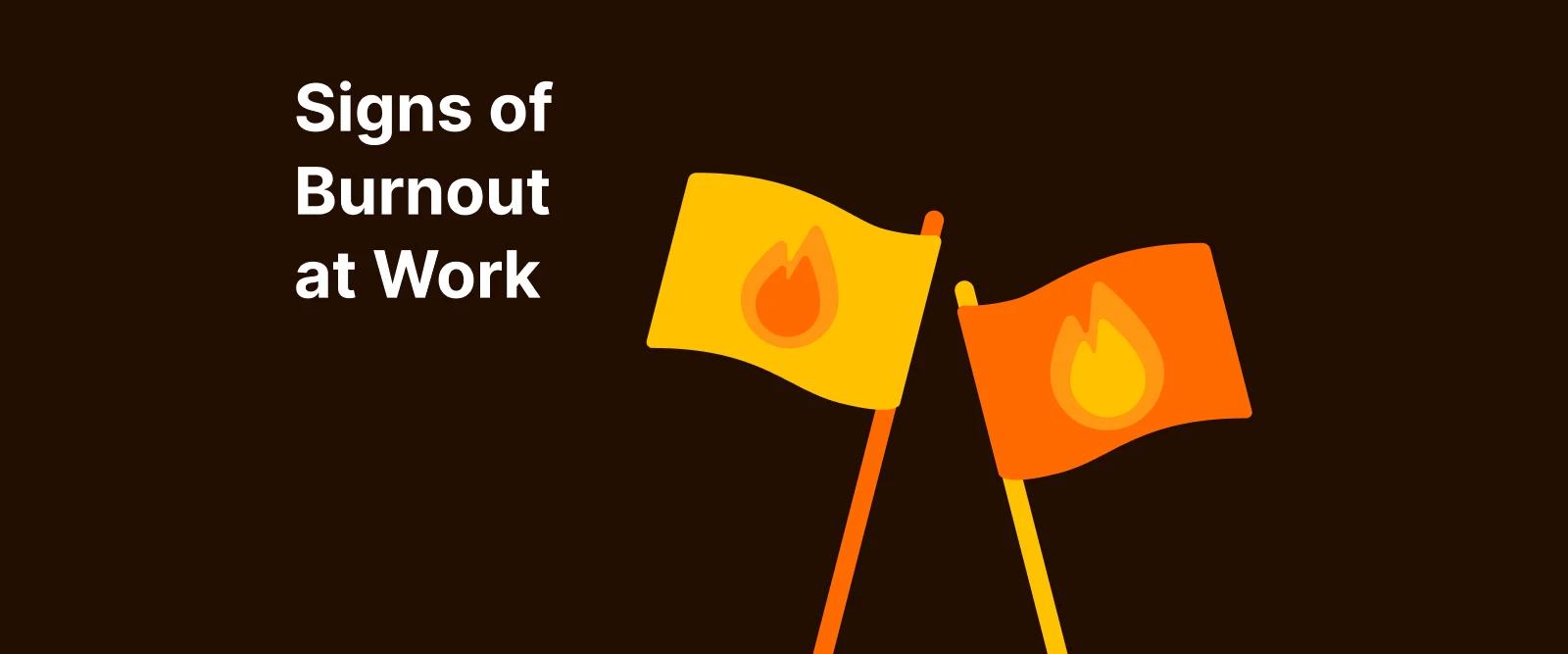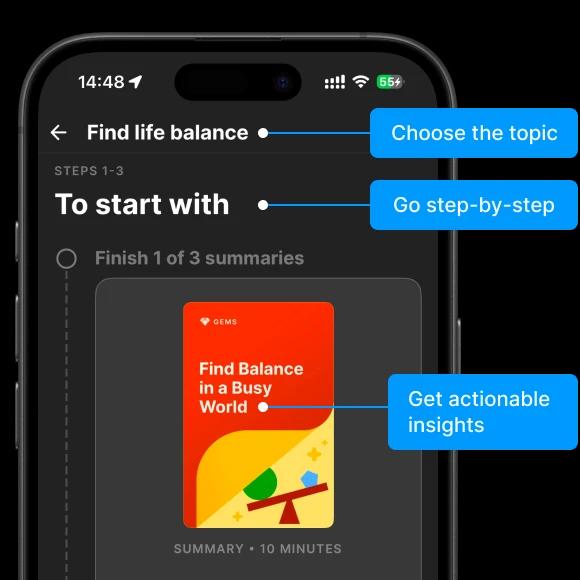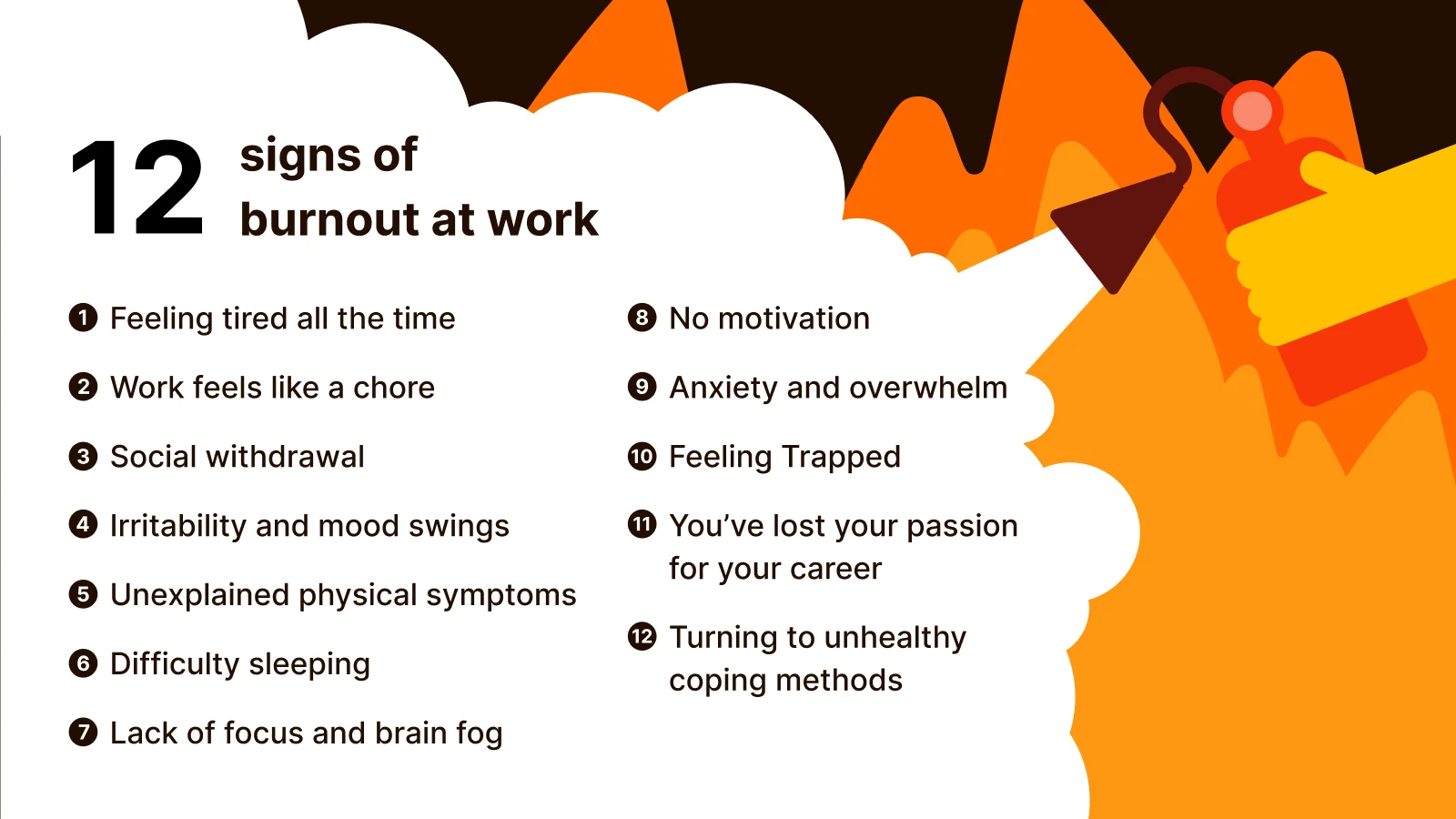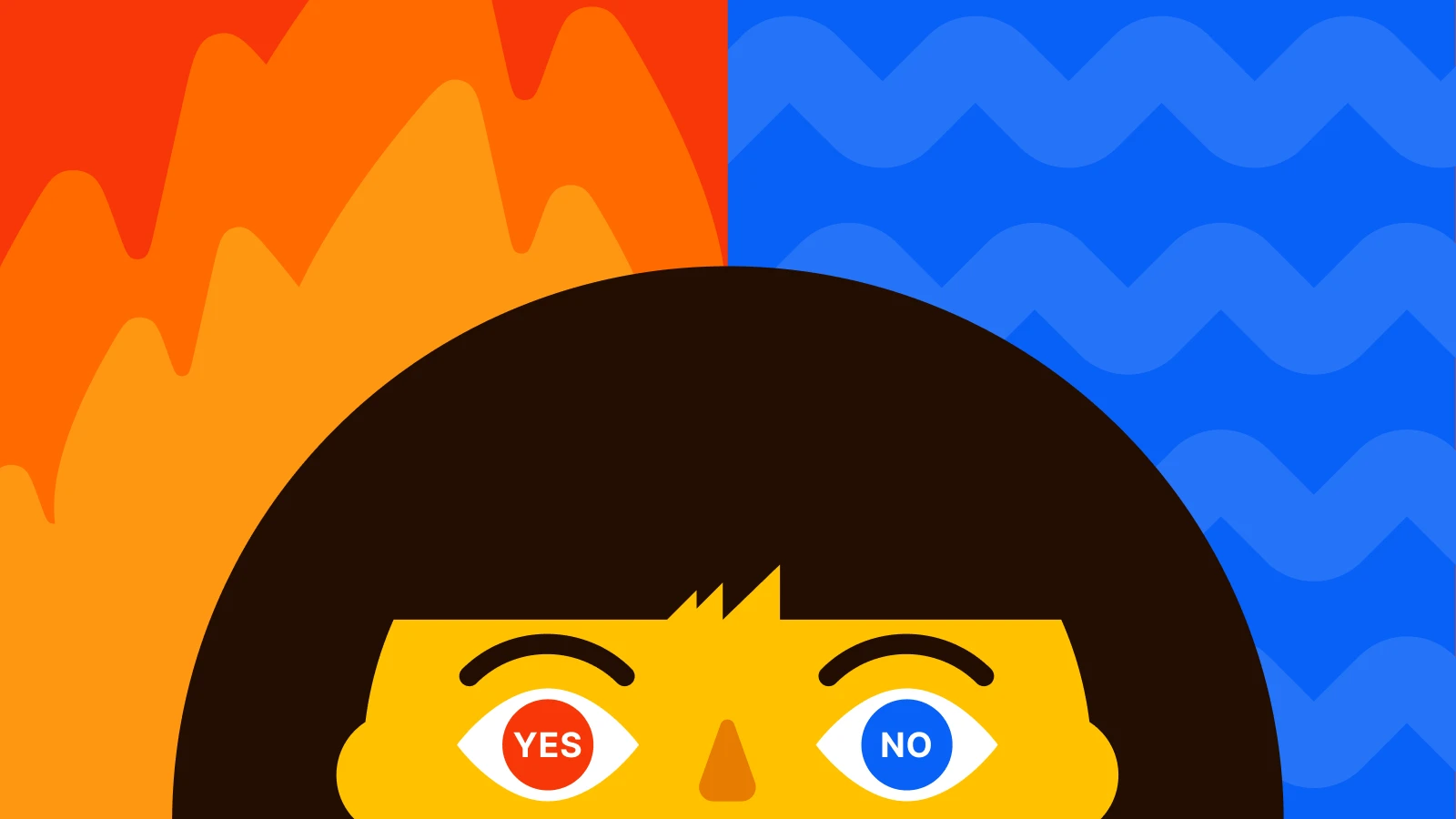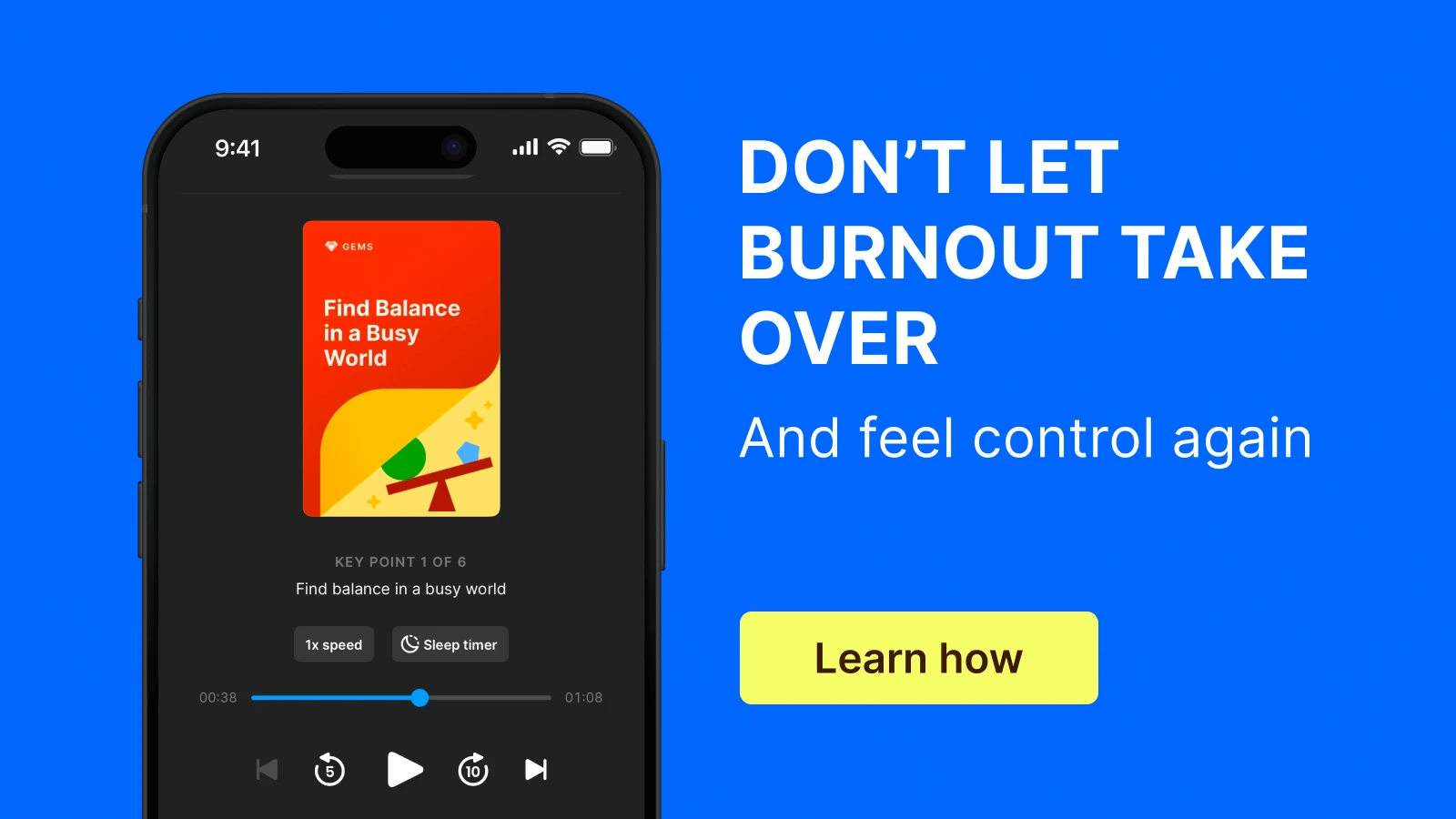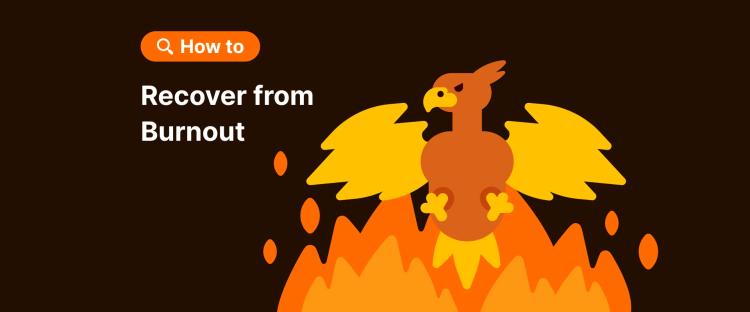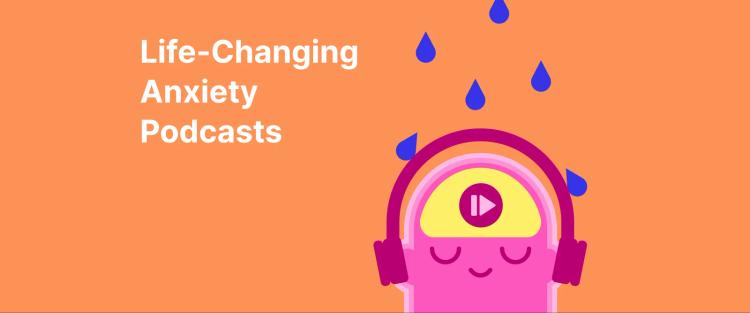You have a bad day, but still drag yourself to work because "everyone else does it too"? According to an Infinite Potential report, 30% of men and 42% of women struggle with workplace burnout. These numbers highlight just how widespread burnout is, yet so many people continue to push through it, thinking it's just part of modern work culture.
Spoiler: It doesn't have to be this way. Recognizing the warning signs matters, but knowing what to do about them is what actually helps. When you're already mentally exhausted, you don't need more tasks — you need quick, practical tools.
Headway gives you 15-minute expert summaries on managing stress, setting boundaries, and building resilience. Our app figures out what you need right now, tracks your progress, and uses flashcards so insights actually stick.
Download Headway today and stop the risk of burnout before it takes over completely!
Quick answer: Six signs of burnout at work
Feeling tired all the time: That deep exhaustion where rest doesn't help. You wake up already drained and need coffee just to make it through.
Work feels like a chore: Everything seems boring or pointless. You're watching the clock, putting stuff off, barely doing what's required.
You've lost your passion: Nothing excites you anymore. Projects feel dull, you're disconnected, and honestly, you're not sure you care about your job at all.
Social withdrawal: You dodge team lunches, ignore messages, and keep your head down, hoping nobody tries to chat.
Irritability and mood swings: Little things set you off — slow internet, someone talking too much. You snap at people and take feedback way too personally.
Difficulty sleeping: Can't fall asleep, or you wake up panicking about tomorrow. Eight hours later, you're still exhausted.
What is burnout, and how do you know if you have it?
Burnout isn't just about having a tough week or feeling tired after a long day. It's a deep, ongoing state of exhaustion that doesn't simply disappear with rest.
It's what happens when stress builds up over time without a real break, eventually leaving you feeling mentally, emotionally, and physically drained. You might sleep for eight hours a night, but still wake up feeling like you've barely rested. It can make even the most minor decisions, like choosing what to eat for lunch, feel overwhelming.
According to the World Health Organization (WHO), burnout isn't classified as a medical condition. However, ultimately, it is more than just chronic workplace stress. It creeps into every aspect of your life.
Your relationships suffer because you don't have the energy to socialize. Your health conditions go downhill because constant stressors make you more likely to get sick. Your sense of self takes a hit, making you question whether you're even capable of handling your job anymore.
However, there is light at the end of the tunnel, as finding the causes of burnout is key to overcoming it.
The longer burnout goes unchecked, the more it takes control of your mental and physical well-being. But by identifying the red flags and understanding what's causing them, you can take intentional steps to reclaim your work-life balance before burnout completely throws your career (and life) off kilter.
Job burnout self-assessment: Are you burnt out?
So, how can you tell if you're actually burnt out or just having a bad week? Let's do a vibe check.
Answer this questionnaire honestly:
"If the results you are getting are lousy - anxiety at a simmer, mild depression, high levels of stress, chronic emotional burnout, then the odds are that something about the system that is your life is off kilter. "― John Mark Comer, 'The Ruthless Elimination of Hurry'
12 signs of work burnout that scream "you need help"
Burnout doesn't happen overnight.
It sneaks up on you slowly, until one day you wake up and no longer feel like yourself. It's not just about being tired; it's about feeling physically, mentally, and emotionally drained to the point where life feels like a chore.
The first step to recovering from burnout is recognizing the need for awareness.
Here's a checklist you may not have known you needed. If any of these red flags affect you personally, it's time to take action.
1. Feeling tired all the time
Burnout-related tiredness isn't just about feeling sleepy. It's a deep, unshakable emotional exhaustion that doesn't go away with rest.
Let me put it this way: You wake up feeling drained already and struggle to get through the day as even the smallest decisions, like choosing what to wear, can feel like climbing a mountain.
Feeling tired all the time often looks like:
Morning dread: You hit snooze again and again because starting your workday feels overwhelming.
Midday crash: Your energy crashes halfway through the day, regardless of whether you got enough sleep the night before.
Relying on quick fixes: You reach for coffee, energy drinks, or sugary snacks just to get through your next meeting.
Trouble concentrating: Even simple tasks feel difficult because your brain is moving at half-speed.
Avoiding social plans: You bail on after-work dinners or drinks because it all feels like too much effort.
2. Work feels like a chore
Maybe you once felt proud of your work, but these days? Every task seems boring or pointless, and you find yourself putting things off more than usual.
This might show up as:
Watching the clock: Counting down the hours until you can log off and go home.
Putting things off: Waiting until the last minute to tackle important tasks because you can't drum up the energy or enthusiasm.
Doing the bare minimum: Zoning out in meetings or contributing as little as possible.
Lower work quality: You notice you're making more mistakes or have a "just get it done" attitude.
Feeling annoyed: New tasks make you roll your eyes or evoke feelings of resentment.
3. You've lost your passion for your career
Once upon a time, you were driven by your career. Now, you feel emotionally disconnected from it, unmotivated, and even irritated with your colleagues. Projects that once excited you now seem dull, leaving you questioning whether you still care about your role.
You might notice:
No excitement about success: You're no longer bothered whether you hit targets or get praise.
Irritation at new projects: Instead of feeling challenged, you feel annoyed when something new comes along.
Going through the motions: You do what's required but rarely push yourself further.
Dreaming of a new path: Thoughts of absenteeism, quitting, or switching fields pop up regularly.
No pride in your work: You struggle to find anything positive to say about your job with friends, family members, or loved ones.
4. Social withdrawal
Burnout can make even the friendliest person want to hide from their colleagues. You might skip small talk or find any online or in-person interaction completely draining.
This can look like:
Avoiding team hangouts: Turning down lunches, coffee breaks, or happy hours more than you used to.
Going silent: Leaving messages on "read" or muting the group work chat.
Keeping your head down: Rushing back to your desk instead of catching up with colleagues in the hallway.
Closed-off posture: Using headphones or your phone as a shield to avoid conversation.
Working solo: Preferring to handle tasks alone rather than teaming up with others.
5. Irritability and mood swings
When you experience burnout, it makes you snappy, impatient, or just plain grumpy.
Minor inconveniences, such as slow Wi-Fi or a talkative colleague, can seem huge. You might catch yourself snapping at people or feeling annoyed for reasons you can’t really explain.
At work, this can show up as:
Short fuse: You get irritated quickly in team chats or during routine tasks.
Frequent spats: Tense email threads or arguments with coworkers over tiny things.
Overreacting to feedback: Feeling personally attacked or getting defensive when someone gives advice.
Harsh self-talk: Blaming yourself or others too harshly for small mistakes.
Ongoing negativity: Rolling your eyes at new ideas or complaining about everyday processes.
6. Unexplained physical symptoms
Stress doesn't just live in your head; your body feels it too.
Burnout can manifest as headaches, neck or back pain, stomach issues, dizziness, or getting sick more often. Your body can't keep up when your stress levels are consistently high.
You might notice:
Aches and pains that won't quit: Tension in your neck and shoulders, made worse by stress.
Sick days stacking up: Calling in sick because of headaches, high blood pressure, stomach upsets, or just feeling run-down.
Afternoon slump: Feeling wiped out after lunch with no energy to finish the workday.
Difficulty staying on task: Physical health discomfort pulls your attention away from what you need to do.
Job stress (when it rebounds at work): Noticing you feel better on weekends, but symptoms return once Monday hits.
7. Difficulty sleeping
Burnout and sleep problems often go hand in hand.
You might toss and turn for hours, wake up in the middle of the night, or feel groggy even after a solid eight hours. It's tough to switch off when your mind keeps replaying deadlines and to-do lists.
You could experience:
Restless nights: Lying awake because your brain won't switch off from work thoughts.
Waking too early: Feeling anxious about the upcoming workday before your alarm goes off.
Using sleep aids: Relying on medication or supplements to knock you out, but still feeling groggy the next day.
Weekend crash: Sleeping in extra late on weekends to make up for the lack of rest during the week.
Slower pace at work: Increased mistakes, procrastinating, or taking longer to finish tasks.
8. Lack of focus and brain fog
If you're reading the same email three times, forgetting deadlines, or feeling mentally sluggish, the effects of burnout might be the reason why. It can mess with your head, making it tough to understand new information or solve problems the way you used to.
Common signs include:
Forgetting key information: Missing important details in meetings or mixing up project specifics.
Trouble handling multiple tasks: Tasks you used to juggle easily now feel like an uphill battle.
Lower productivity: Taking longer to get your work done or feeling scatterbrained throughout the day.
Constant fogginess: Feeling like your brain is on a slow speed, even after breaks.
Missed deadlines: Needing constant reminders because tasks slip off your radar.
9. No motivation
Burnout can suck the joy out of everything, including your personal life outside of the work environment.
You may lose interest in your usual hobbies, outings, and personal goals. Suddenly, everything feels like too much effort, and you start saying "no" more often than not.
A lack of motivation at work can show up as:
Not caring about results: Whether a project goes well or not, you just want it finished.
Dropping extra activities: Leaving work-related groups or skipping events you once enjoyed.
Passing on growth opportunities: Turning down training or courses you would have jumped at before.
Zoning out in meetings: Giving short, unenthusiastic answers or blank stares.
No goals to aim for: No longer thinking about promotions, raises, or other career goals.
10. Turning to unhealthy coping methods
When burnout hits, many people try to escape or numb themselves in unhelpful ways like binge-watching Netflix, endlessly scrolling on social media, bad eating habits (under- or overeating), drinking more than usual, or shutting everyone out.
These may seem like quick fixes, but they often exacerbate burnout over time. These can also resemble:
Nightly binges: Overdoing it on junk food or alcohol after you log off "just to relax."
Too much social media: Scrolling endlessly at your desk instead of focusing on tasks.
Running from responsibilities: Taking extra coffee breaks to dodge your workload.
Emotional shutdown: Tuning out stress instead of tackling problems head-on.
Last-minute panic: Avoiding certain tasks until they become super-urgent.
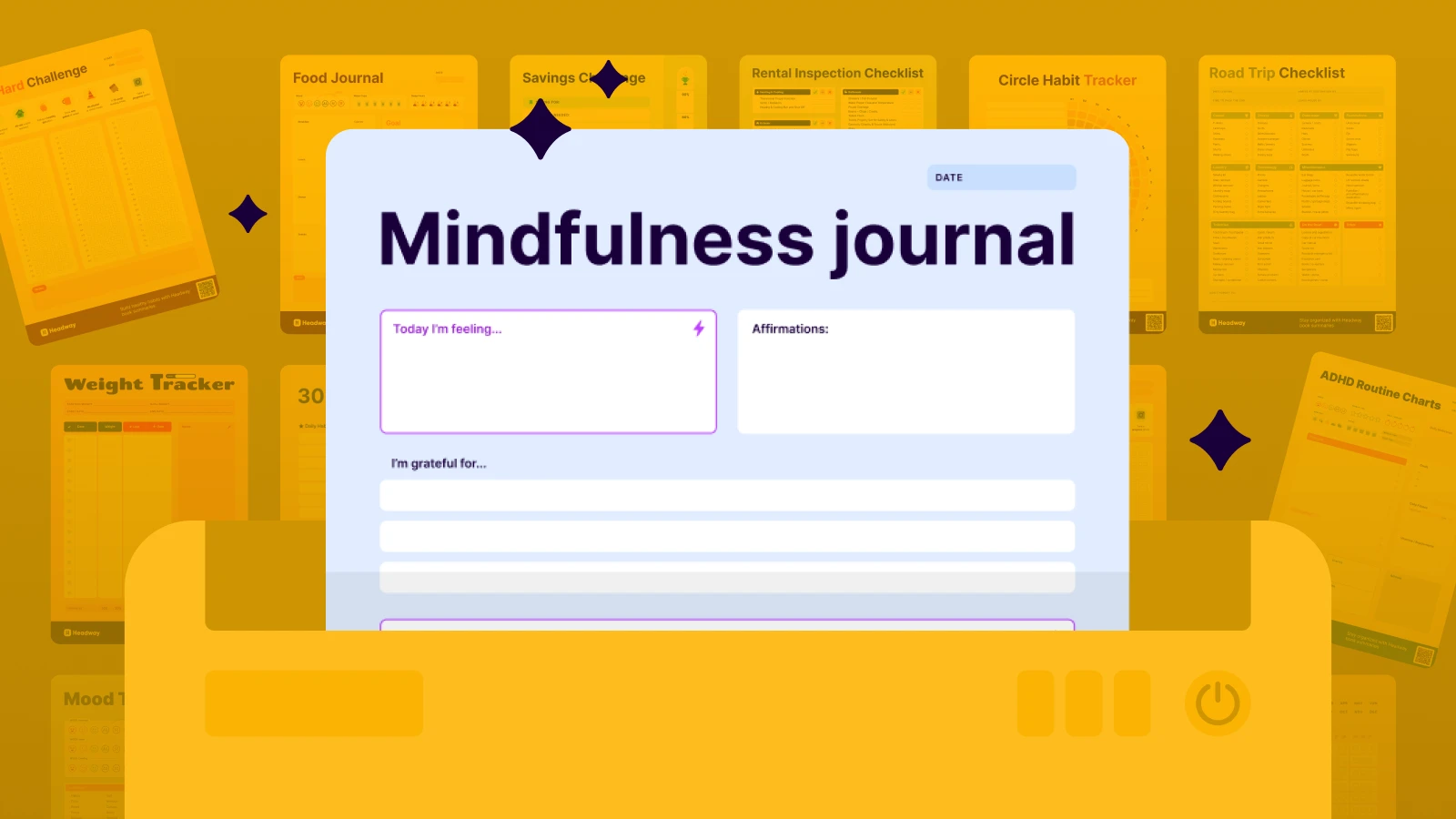
11. Anxiety and overwhelm
Feeling like you can't keep up can lead to a constant sense of worry or dread. Tasks that once felt simple now seem huge, and the idea of facing another busy week makes you feel anxious, especially on Sunday nights. It's almost like you're always bracing for the worst.
This can look like:
Sunday scaries: That knot in your stomach before the workweek even begins.
Never-ending self-doubt: Worrying you're not good enough or fearing others will realise you're struggling.
Avoiding tricky tasks: Putting off anything that seems remotely difficult because you're already overwhelmed.
Overthinking easy projects: Spending way too long on simple things because you're scared of messing up.
Physical stress signals: Sweaty palms, a racing heartbeat, or shallow breathing whenever new assignments pop up.
12. Feeling Trapped
"Stress is not bad for you; being stuck is bad for you." ― Emily Nagoski, 'Burnout: The Secret to Unlocking the Stress Cycle'
A big sign of burnout is feeling like there's no escape. You might imagine quitting, but stay put because of bills, job security, or fear of the unknown. Telling yourself, "This is just how work is," becomes a coping mechanism, even though deep down you know something's got to change.
Feeling trapped might show up as:
Dreaming of walking out: Fantasising about leaving your job and never going back.
No effort to change things: Not talking to HR, your manager, or anyone else because it feels pointless.
Worrying about the future: Staying in a bad situation because jumping into something new feels riskier.
Blaming others: Feeling like your boss or teammates are the main problem, but believing you can't do anything about it.
Hopelessness: Believing you'll never escape the cycle, so why even try?
Your mental health matters more than your job title!
Burnout isn't just about feeling stressed or annoyed with your job.
It's not just about the workload either. It's a more profound and overwhelming issue that requires your attention, characterized by unrealistic demands, blurred boundaries, and a loss of self-awareness.
The good news is that symptoms of burnout don't have to mean the end of your career.
It's a wake-up call if anything. It's a sign that something needs to change. But that doesn't mean you have to quit your job and start over.
Here's what it comes down to:
Alignment: When you clarify what you truly value, you can start making decisions that align with the daily life you actually want, not the one you're coasting through.
Shifting your mindset: Your boss isn't the villain here (well, not entirely). Sometimes, the problem is how you see things. Beating burnout might simply be about flipping the script, focusing on what you can control, and not letting the little things suck the life out of you.
Building a self-care toolkit: Burnout doesn't just disappear on its own. You need tools that actually work. It's all about building routines, habits, and hobbies that keep you feeling good, and not turning to quick-fix solutions.
Setting clear boundaries: If you don't protect your time and energy, such as taking time off or going on vacation, no one else will. Embrace the power of "no" before burnout decides for you.
Chatting to a healthcare professional: Sometimes you need an outside perspective to help you see the bigger picture (check-ins, caregivings). A therapist, mental health professional, or doctor can give you the tools and insights you need to navigate all stages of burnout and emerge stronger.
Remember, burnout isn't something to "push through." The sooner you recognize it, the sooner you can take steps to regain your energy, motivation, and life. If you're feeling overwhelmed, just know that you are not alone, and things will get better.
You've got this!
Stop burnout in its tracks with help from Headway!
Identifying burnout is one thing, but knowing how to respond is another. When you're already exhausted, the last thing you need is one more task that feels overwhelming. Headway offers 15-minute expert summaries to help you absorb and learn about stress management, boundary setting, mental health, and burnout recovery stages.
The Headway app customizes recommendations based on your current navigation, tracks your progress so you can see your progress, and provides flashcards to help solidify insights, ensuring you remember them.
Download Headway today and give yourself tools that can help you recognize burnout earlier, protect your mental health, and recover from it before it's too late!
For more resources, explore Headway’s burnout collection.
FAQs about the signs of burnout at work
How can I tell if I'm experiencing burnout at work?
Look for chronic fatigue that doesn't improve with rest, a feeling of emotional detachment from your work, loss of motivation, physical complaints such as dizziness or insomnia, and avoidance of coworkers. If you have experienced multiple weeks of feeling overwhelmed, joyless, and barely making it through your to-do list, you may be burned out.
What exactly does burnout feel like?
Burnout feels like you literally can't give because you are drained — physically, emotionally, or mentally — to the point that you are dragging yourself through each day despite how much you may rest. You are either apathetic or irritable about everything, and everything you do requires a great deal of effort. You feel stuck or hopeless, and disconnected from who you are.
Who is most at risk of burnout?
Burnout is most common in high-stress careers, such as healthcare work, teaching, customer service, and therapy. Factors that may also contribute to and increase risk include overly heavy workloads, a lack of control over one's work, poorly defined or unclear expectations, inadequate support, or a lack of work-life balance. Perfectionists, as well as anyone who struggles to set boundaries, are at a specific risk for burnout.
Do I hate my job, or am I burnt out?
Burnout makes you feel tired, apathetic, and overwhelmed — but it limits your ability to recover from burnout. If you hate your job, even after setting and maintaining healthy boundaries, you still may not find a role that aligns with your values or addresses your needs. And you may realize that recovering from burnout doesn't return your work or worldview to a meaningful commitment.
Should I resign due to burnout?
You should postpone your resignation until you have recovered from burnout, as it can impact your rational thinking and ability to make everyday decisions. First, try the concept of recovery: consider setting boundaries, taking time off, or addressing the causes of your burnout. Quitting may be a great option if you realize you work in a toxic work environment and see no hope for it to change.

